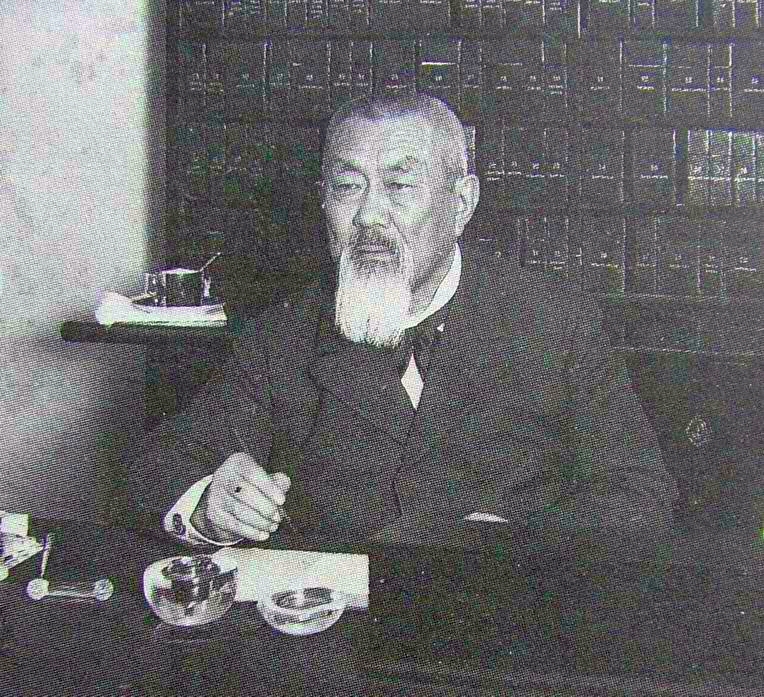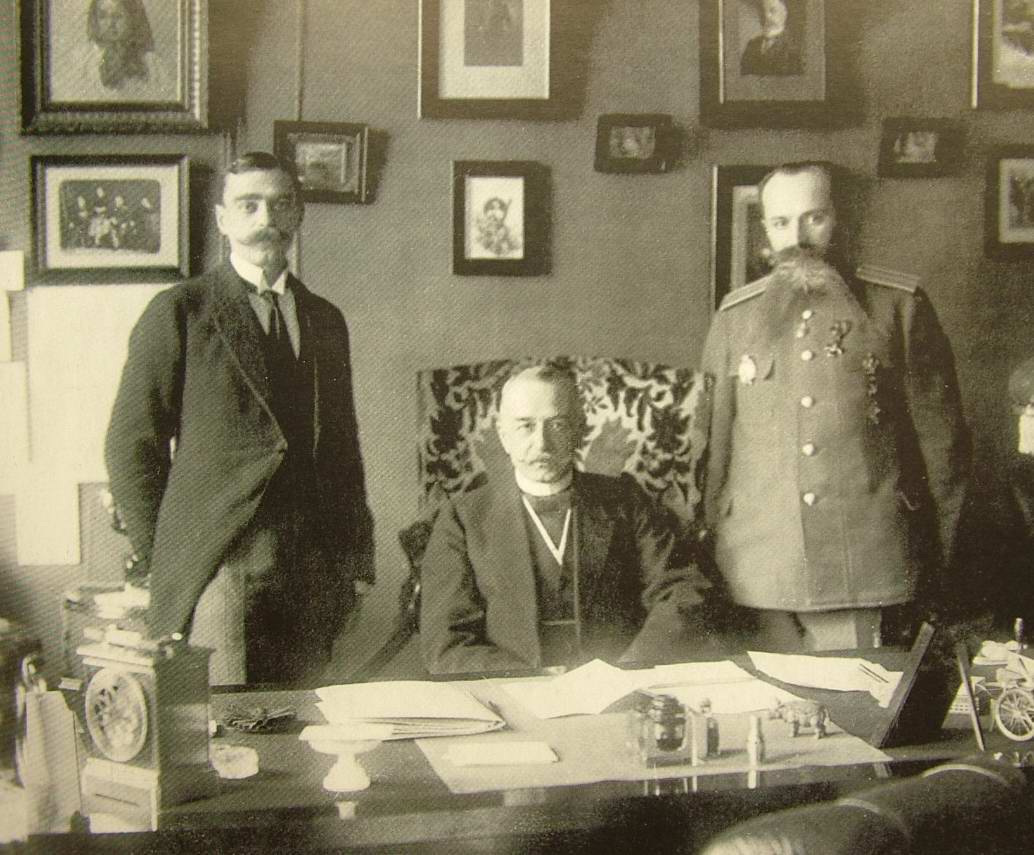|
Peter Badmayev
Pyotr Aleksandrovich Badmayev or Peter Badmayev, born ZhamsaranSaxer, Martin, 2004, ''Journeys with Tibetan Medicine: How Tibetan Medicine Came to the West. The Story of the Badmayev Family.'' M.A. thesis in Social and Cultural Anthropology, University of Zurich. http://anyma.ch/journeys/doc/thesis.pdf. Retrieved 2012.03.27. P. 25. (Russian: Пётр Александрович Бадмаев: Pyotr Aleksandrovich Badmayev; ca. 1850 – July 29, 1920), was a doctor and political figure in the Russian Empire. He was an ethnic Buryat from Buryatia. He played a large part in introducing Tibetan medicine to imperial Russia, and was also active in politics in the late 19th and early 20th century. Early life Badmayev came from a Buddhist family, and his elder brother was Alexander Badmayev, a doctor of Tibetan medicine whose skills so impressed Alexander II that the tsar allowed him to practice in St. Petersburg. Peter converted to Orthodoxy after he became Alexander III’s godson ... [...More Info...] [...Related Items...] OR: [Wikipedia] [Google] [Baidu] |
Tibet
Tibet (; ''Böd''; ) is a region in East Asia, covering much of the Tibetan Plateau and spanning about . It is the traditional homeland of the Tibetan people. Also resident on the plateau are some other ethnic groups such as Monpa people, Monpa, Tamang people, Tamang, Qiang people, Qiang, Sherpa people, Sherpa and Lhoba peoples and now also considerable numbers of Han Chinese and Hui people, Hui settlers. Since Annexation of Tibet by the People's Republic of China, 1951, the entire plateau has been under the administration of the People's Republic of China, a major portion in the Tibet Autonomous Region, and other portions in the Qinghai and Sichuan provinces. Tibet is the highest region on Earth, with an average elevation of . Located in the Himalayas, the highest elevation in Tibet is Mount Everest, Earth's highest mountain, rising 8,848.86 m (29,032 ft) above sea level. The Tibetan Empire emerged in the 7th century. At its height in the 9th century, the Tibet ... [...More Info...] [...Related Items...] OR: [Wikipedia] [Google] [Baidu] |
Physicians From The Russian Empire
A physician (American English), medical practitioner ( Commonwealth English), medical doctor, or simply doctor, is a health professional who practices medicine, which is concerned with promoting, maintaining or restoring health through the study, diagnosis, prognosis and treatment of disease, injury, and other physical and mental impairments. Physicians may focus their practice on certain disease categories, types of patients, and methods of treatment—known as specialities—or they may assume responsibility for the provision of continuing and comprehensive medical care to individuals, families, and communities—known as general practice. Medical practice properly requires both a detailed knowledge of the academic disciplines, such as anatomy and physiology, underlying diseases and their treatment—the '' science'' of medicine—and also a decent competence in its applied practice—the art or '' craft'' of medicine. Both the role of the physician and the m ... [...More Info...] [...Related Items...] OR: [Wikipedia] [Google] [Baidu] |
1920 Deaths
Nineteen or 19 may refer to: * 19 (number), the natural number following 18 and preceding 20 * one of the years 19 BC, AD 19, 1919, 2019 Films * ''19'' (film), a 2001 Japanese film * ''Nineteen'' (film), a 1987 science fiction film Music * 19 (band), a Japanese pop music duo Albums * ''19'' (Adele album), 2008 * ''19'', a 2003 album by Alsou * ''19'', a 2006 album by Evan Yo * ''19'', a 2018 album by MHD * ''19'', one half of the double album '' 63/19'' by Kool A.D. * '' Number Nineteen'', a 1971 album by American jazz pianist Mal Waldron * ''XIX'' (EP), a 2019 EP by 1the9 Songs * "19" (song), a 1985 song by British musician Paul Hardcastle. * "Nineteen", a song by Bad4Good from the 1992 album ''Refugee'' * "Nineteen", a song by Karma to Burn from the 2001 album ''Almost Heathen''. * "Nineteen" (song), a 2007 song by American singer Billy Ray Cyrus. * "Nineteen", a song by Tegan and Sara from the 2007 album '' The Con''. * "XIX" (song), a 2014 song by Slip ... [...More Info...] [...Related Items...] OR: [Wikipedia] [Google] [Baidu] |
1850s Births
Year 185 ( CLXXXV) was a common year starting on Friday (link will display the full calendar) of the Julian calendar. At the time, it was known as the Year of the Consulship of Lascivius and Atilius (or, less frequently, year 938 ''Ab urbe condita''). The denomination 185 for this year has been used since the early medieval period, when the Anno Domini calendar era became the prevalent method in Europe for naming years. Events By place Roman Empire * Nobles of Britain demand that Emperor Commodus rescind all power given to Tigidius Perennis, who is eventually executed. * Publius Helvius Pertinax is made governor of Britain and quells a mutiny of the British Roman legions who wanted him to become emperor. The disgruntled usurpers go on to attempt to assassinate the governor. * Tigidius Perennis, his family and many others are executed for conspiring against Commodus. * Commodus drains Rome's treasury to put on gladiatorial spectacles and confiscates property to ... [...More Info...] [...Related Items...] OR: [Wikipedia] [Google] [Baidu] |
Bernard Pares
Sir Bernard Pares KBE (1 March 1867 – 17 April 1949) was an English historian and diplomat. During the First World War, he was seconded to the Foreign Ministry in Petrograd, Russia, where he reported political events back to London, and worked in propaganda. He returned to London as professor of Russian history. He is best known for his numerous books on Russia, especially his standard textbook, ''A History of Russia'' (1926), which had highly detailed coverage of the revolutionary era. He was a very active public speaker in the 1940s in support of Stalin's Soviet Union. Early life and family Bernard Pares was one of ten children of the marriage between Katharine (née Back) and John Pares; he had four brothers (George (Lancelot), Norman, Basil and Howard) and five sisters (Alice, Ethel, Margaret, Constance and May). His father was the son of Thomas Pares (1790–1866), who was M.P. for Leicester from 1818 to 1826. His mother was the sister of Admiral Sir George Back FRS (1 ... [...More Info...] [...Related Items...] OR: [Wikipedia] [Google] [Baidu] |
Tsarevich Alexei Of Russia
Alexei Nikolaevich (russian: link=no, Алексе́й Никола́евич) (12 August .S. 30 July1904 – 17 July 1918) was the last Tsesarevich ( heir apparent to the throne of the Russian Empire). He was the youngest child and only son of Emperor Nicholas II and Empress Alexandra Feodorovna. He was born with haemophilia, which his parents tried treating with the methods of a peasant faith healer named Grigori Rasputin. After the February Revolution of 1917, the Romanovs were sent into internal exile in Tobolsk, Siberia. After the October Revolution, the family was initially to be tried in a court of law, before the intensification of the Russian Civil War made execution increasingly favorable in the eyes of the Soviet government. With White Army soldiers rapidly approaching, the Ural Regional Soviet ordered the murder of Alexei, the rest of his family, and four remaining retainers on 17 July 1918. Rumors persisted for decades that Alexei had escaped his executio ... [...More Info...] [...Related Items...] OR: [Wikipedia] [Google] [Baidu] |
Grigori Rasputin
Grigori Yefimovich Rasputin (; rus, links=no, Григорий Ефимович Распутин ; – ) was a Russian mystic and self-proclaimed holy man who befriended the family of Nicholas II, the last Emperor of Russia, thus gaining considerable influence in late Imperial Russia. Rasputin was born to a peasant family in the Siberian village of Pokrovskoye in the Tyumensky Uyezd of Tobolsk Governorate (now Yarkovsky District of Tyumen Oblast). He had a religious conversion experience after taking a pilgrimage to a monastery in 1897. He has been described as a monk or as a (wanderer or pilgrim), though he held no official position in the Russian Orthodox Church. He traveled to St. Petersburg in 1903 or the winter of 1904–1905, where he captivated some church and social leaders. He became a society figure and met Emperor Nicholas and Empress Alexandra in November 1905. In late 1906, Rasputin began acting as a healer for the imperial couple's only son, Ale ... [...More Info...] [...Related Items...] OR: [Wikipedia] [Google] [Baidu] |
Felix Yusupov
Prince Felix Felixovich Yusupov, Count Sumarokov-Elston (russian: Князь Фе́ликс Фе́ликсович Юсу́пов, Граф Сумаро́ков-Эльстон, Knyaz' Féliks Féliksovich Yusúpov, Graf Sumarókov-El'ston; – 27 September 1967) was a Russian aristocrat from the Yusupov family who is best known for participating in the assassination of Grigori Rasputin and for marrying Princess Irina Alexandrovna, a niece of Tsar Nicholas II. Early life He was born in the Moika Palace in Saint Petersburg, the capital of the Russian Empire.; born c. 1522 – 23 April 1586), also known as Nikita Romanovich Zakharyin-Yuriev, who was a prominent boyar of the Tsardom of Russia. His grandson Michael I (Tsar 1613-1645) founded the Romanov dynasty of Russian tsars. Anastasia and Marfa were the paternal aunts of Tsar Michael I of Russia of Russia and the paternal nieces of Tsaritsa Anastasia Romanovna Zakharyina-Yurieva of Russia. His father was Count Felix Felixov ... [...More Info...] [...Related Items...] OR: [Wikipedia] [Google] [Baidu] |
Alexander Protopopov
Alexander Dmitrievich Protopopov (; 18 December 1866 – 27 October 1918) was a Russian publicist and politician who served as Minister of the Interior from September 1916 to February 1917. Protopopov became a leading liberal politician in Russia after the Russian Revolution of 1905 and elected to the State Duma with the Octobrist Party. Protopopov was appointed Minister of the Interior with the support of Empress Alexandra during World War I, but his inexperience and mental instability failed to relieve the effects of the war on Russia and contributed to the decline of the Imperial government. Protopopov remained Minister of the Interior despite attempts to remove him for his policy failures, worsening mental state, and close relationship with Grigori Rasputin until he was forced to resign shortly before the February Revolution. According to Bernard Pares, Protopopov "was merely a political agent; but his intentions as to policy, considering the post which he held, are of hi ... [...More Info...] [...Related Items...] OR: [Wikipedia] [Google] [Baidu] |
Iliodor
Sergei Michailovich Trufanov ( Russian: Серге́й Миха́йлович Труфа́нов; formerly Hieromonk Iliodor or Hieromonk Heliodorus, russian: Иеромонах Илиодор; October 19, 1880 – 28 January 1952) was a lapsed hieromonk, a charismatic preacher, an enfant terrible of the Russian Orthodox church, panslavist, and actor. He is known primarily for his semi-autobiographical book about Rasputin. In this work he was supported by Maxim Gorky, since 1902 a friend of Lenin. Gorky hoped that Trufanov's story on Rasputin would discredit the Tsar's family and eventually contribute to the revolutionary propaganda. Biography Sergei Trufanov was born in stanitsa Mariinskaya and grew up in a small cottage near the Don river as the son of a local deacon. He was one of thirteen children; according to himself five died young of starvation. At the age of ten he went to school in Novocherkassk. At the age of 15 he entered the local theological seminary. Five year ... [...More Info...] [...Related Items...] OR: [Wikipedia] [Google] [Baidu] |
Gombojab Tsybikov
Gombojab Tsybikov (russian: link=no, Гомбожаб Цэбекович Цыбиков ''Gombozhab Tsebekovich Tsybikov''; bua, Цэбэгэй Гомбожаб, mn, Цэвэгийн Гомбожав, alternatively romanized as Gombozhab and Tsybikoff) (20 April 1873 – 20 September 1930), was a Russian explorer of Tibet from 1899 to 1902. Tsybikov specialized in ethnography, Buddhist Studies, and after 1917 was an important educator and statesman in Siberia and Mongolia. Tsybikov is mostly credited for being the first photographer of Tibet, including Lhasa. His travelogue, issued in Russian in 1919, 1981, and 1991, and translated into several languages (Chinese, Czech, English, French, and Polish), included a lot of materials from Tibetan sources on Tibetan history and first-hand accounts on Tibetan affairs of the time, making it an important reference source. Biography Early years Gombojab Tsybikov, also during early life surnamed Montuev (Монтуев), was ... [...More Info...] [...Related Items...] OR: [Wikipedia] [Google] [Baidu] |








